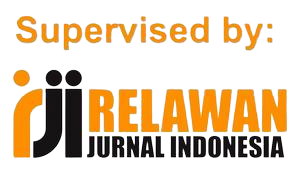Gameful Experience and Brand Loyalty: Exploring Customer Brand Engagement in Language Learning Apps
Abstract
Keywords
Full Text:
PDFReferences
Abbasi, A. Z., Rehman, U., Fayyaz, M. S., Ting, D. H., Shah, M. U., & Fatima, R. (2022). Using the playful consumption experience model to uncover behavioral intention to play Multiplayer Online Battle Arena (MOBA) games. Data Technologies and Applications, 56(2), 223–246. https://doi.org/10.1108/DTA-02-2021-0055
Abidin, A. (2023). Screen distractions during Memrise MALL experience: Course-of-action study on students’ performance and perception. JOALL (Journal of Applied Linguistics and Literature), 8(2), 245–263. https://doi.org/10.33369/joall.v8i2.25462
Amelina, S. M., Tarasenko, R. O., Semerikov, S. O., & Shen, L. (2022). Using mobile applications with augmented reality elements in the self-study process of prospective translators. Educational Technology Quarterly, 22(4), 263–275. https://doi.org/10.55056/etq.51
Andriyani, N. K. R., & Yudhistira, P. G. A. (2023). How Does Conventional Travel Agent Services Enhance Brand Loyalty? The Relationship Between Customer Experience, Brand Credibility, and Brand Trust. Jurnal Manajemen Teori Dan Terapan| Journal of Theory and Applied Management, 16(1), 162–178. https://doi.org/10.20473/jmtt.v16i1.43170
Angelina, J., & Nurlinda, R. A. (2023). The Influence of Brand Experience and Brand Personality on Brand Loyalty Through Brand Love. Jurnal Scientia. 12(03), 2677-2693. https://doi.org/10.58471/scientia.v12i03.1620
Atifah, N., Johnson, S., Amin, A. M., Ilham, M., Haeruddin, W., Ruma, Z., & Hasdinansa, I. W. (2024). Journal of Applied Management Research The Effect of Digital Promotion and Brand Awareness on Purchasing Decisions on Scarlett Whitening Skincare Products (Study on TikTok Shop User Students at FEB UNM). Journal of Applied Management Research, 4(1), 55-64. https://doi.org/10.36441/jamr
Bagdi, H., Pothabathula, S. V., Sharma, L., & Bulsara, H. P. (2023). The global market upsurge in web traffic and revenues during the epidemic: an exploratory research of e-learning companies. International Journal of Development Issues, 22(3), 418–444. https://doi.org/10.1108/IJDI-06-2023-0147
Baykal, B. (2023). Brands on play: Harnessing the power of gamification for success. Ozgur Journal, 1(11), 227–248. https://doi.org/10.58830/ozgur.pub311.c1365
Bouzaabia, O., Arbia, M. Ben, Varón, D. J. J., & Chui, K. T. (2024). The Consequences of Gamification in Mobile Commerce Platform Applications. International Journal on Semantic Web and Information Systems, 20(1), 1-20. https://doi.org/10.4018/IJSWIS.337599
Cahyadi, F. C., & Tunjungsari, H. K. (2023). The Influence of Brand Interactivity, Involvement, and Social Media CBE on Loyalty: Trust as a Mediation Variable. International Journal of Application on Economics and Business, 1(3), 1749–1757. https://doi.org/10.24912/ijaeb.v1i3.1749-1757
Demir, M. Ö., & Demir, Z. G. (2020). Oyunlaştırma Özelliklerinin Marka Sadakati Üzerine Etkisi. Journal of Yaşar University, 15(58), 270-287. https://doi.org/10.19168/jyasar.558862
Dewi, Y., & Indra, I. (2024). Journal of Applied Management Research Navigating Consumer Behaviour: Exploring the Influence of Fashion Trends and Social Media on Gen Z and Millennial Consumption in West Java. Journal of Applied Management Research, 4(1), 1-9. https://doi.org/10.36441/jamr
Disse, I. K., & Olsson, M. (2023). Uncovering the gamified customer experience in the retail environment. International Journal of Retail & Distribution Management, 51(7), 955–971. https://doi.org/10.1108/IJRDM-07-2022-0268
Esmaeilzadeh, P. (2021). The influence of gamification and information technology identity on postadoption behaviors of health and fitness app users: Empirical study in the united states. JMIR Serious Games, 9(3), 282. https://doi.org/10.2196/28282
Essafi, M., Belfakir, L., & Moubtassime, M. (2024). Investigating Mobile-Assisted Language Learning Apps: Babbel, Memrise, and Duolingo as a Case Study. Journal of Curriculum and Teaching, 13(2), 197–215. https://doi.org/10.5430/jct.v13n2p197
Farhat, K., Mohd Mokhtar, S. S., & Salleh, S. Md. (2020). Linking Brand Engagement to Customer-Based Brand Equity and Role of Brand Experience, Brand Personality, and Brand Affect: A Case of Automobile Market of Pakistan. Management Science Letters, 10(10), 2237-2248. https://doi.org/10.5267/j.msl.2020.3.012
Fitria, T. N. (2023). Common European Framework of Reference for Languages (CEFR) Standard in Bahasa Indonesia bagi Penutur Asing (BIPA) Textbook: A Competency Mapping Analysis. Lingua Didaktika: Jurnal Bahasa Dan Pembelajaran Bahasa, 17(2), 139. https://doi.org/10.24036/ld.v17i2.124244
Folmsbee, D., & Hutchison, G. (2021). Assessing conformer energies using electronic structure and machine learning methods. International Journal of Quantum Chemistry, 121(1), 263. https://doi.org/10.1002/qua.26381
Hadi Mogavi, R., Guo, B., Zhang, Y., Haq, E. U., Hui, P., & Ma, X. (2022). When Gamification Spoils Your Learning: A Qualitative Case Study of Gamification Misuse in a Language-Learning App. L@S 2022 - Proceedings of the 9th ACM Conference on Learning @ Scale, 175–188. https://doi.org/10.1145/3491140.3528274
Hadina, N., Sari, M. K., & Yoni, E. (2023). Student’s Perception Of Using Duolingo As An English Learning Application. Journal of Educational Management and Strategy, 2(2), 146–154. https://doi.org/10.57255/jemast.v2i2.291
Hans, S., Rizky, F., Purmono, B. B., Afifah, N., & Setiawan, H. (2023). The Relevance of iBox Store Atmosphere: Building Customer Satisfaction and Loyalty. International Journal of Scientific Research and Management, 11(01), 4451–4457. https://doi.org/10.18535/ijsrm/v11i01.em05
Hsu, T. H., Chen, C. H., & Yang, Y. W. (2021). A decision analysis model for the brand experience of branded apps using consistency fuzzy linguistic preference relations. Symmetry, 13(7), 1151. https://doi.org/10.3390/sym13071151
Huang, D. H., Chueh, H. E., Huang, H. Te, Tzou, Y. T., & Kao, C. Y. (2021). A Study on the Usage Intention of Japanese Learning Mobile Applications. International Journal of Emerging Technologies in Learning, 16(17), 255–266. https://doi.org/10.3991/ijet.v16i17.24235
Huntington, B., Goulding, J., & Pitchford, N. J. (2023). Pedagogical features of interactive apps for effective learning of foundational skills. British Journal of Educational Technology, 54(5), 1273–1291. https://doi.org/10.1111/bjet.13317
Irwit Santi, L., Hilal, A., & Kudus, B. (2023). Review of Duolingo Application in Learning English. Journal of English Language Education and Literature, 8(2), 56–63. https://doi.org/10.30599/channing.v8i2.2079
Kamsik, A. E. (2023). Students’ Perception on the Use of the Duolingo Application as a Medium for Developing University-Level English Language Skills. Journal of English Language Teaching and Learning (Jetle), 5(1), 1-19. https://doi.org/10.18860/jetle.v5i2.23667
Kruchinin, S., & Bagrova, E. (2021). Quality of Mobile Apps for Language Learning. SHS Web of Conferences, 93, 01009. https://doi.org/10.1051/shsconf/20219301009
Landers, R. N., Armstrong, M. B., Collmus, A. B., Mujcic, S., & Blaik, J. (2022). Theory-Driven Game-Based Assessment of General Cognitive Ability: Design Theory, Measurement, Prediction of Performance, and Test Fairness. Journal of Applied Psychology, 107(10), 1655. https://doi.org/10.1037/apl0000954
Ledikwe, A. (2020). Determinants of Brand Loyalty in the Apparel Industry: A Developing Country Perspective. Cogent Business & Management, 7(1), 1787736. https://doi.org/10.1080/23311975.2020.1787736
Mallafré-Larrosa, M., Papi, G., Trilla, A., & Ritchie, D. (2023). Development and Promotion of an mHealth App for Adolescents Based on the European Code Against Cancer: Retrospective Cohort Study. JMIR Cancer, 9(1), 48040. https://doi.org/10.2196/48040
Metruk, R. (2021). The use of smartphone english language learning apps in the process of learning english: Slovak efl students’ perspectives. Sustainability (Switzerland), 13(15), 8205. https://doi.org/10.3390/su13158205
Mok, T. L. (2024). Fun as the Principle Experience: A Systematic Review of Gamification in Marketing, 1(1), 1–43. https://doi.org/10.32920/25164581
Muslimin, A. I. (2023). EFL Apps Potential Unleashed: Enhancing Pre-Service Teachers’ Digital Literacy via Tech-Vlog. English Franca Academic Journal of English Language and Education, 7(2), 231-242. https://doi.org/10.29240/ef.v7i2.7935
Nehe, B. M., Mualimah, E. N., Bastaman, W. W., Arini, I., Purwantiningsih, S., Setia, U., & Rangkasbitung, B. (2023). Exploring English Learners’ Experiences of Using Mobile Language Learning Applications. 25(1), 76–90. https://doi.org/10.21009/JTP2001.6
Pan, P., & Phua, J. (2020). Connecting Sponsor Brands Through Sports Competitions: An Identity Approach to Brand Trust and Brand Loyalty. Sport Business and Management an International Journal, 11(2), 164-184. https://doi.org/10.1108/sbm-01-2019-0003
Parra-González, M. E., Segura-Robles, A., Moreno-Guerrero, A. J., & López-Belmonte, J. (2022). Elaboration and Validation of the Scale to Measure the Experience on Gamification in Education (EGAMEDU). Journal of Technology and Science Education, 12(1), 217–229. https://doi.org/10.3926/JOTSE.1505
Pebrianti, W., & Miranda, N. (2023). Does the millennial and non-millennial generations moderate the relationship between brand loyalty and brand experience? International Journal of Scientific Research and Management (IJSRM), 11(09), 5069–5076. https://doi.org/10.18535/ijsrm/v11i09.em02
Peco-Torres, F., Polo Peña, A. I., & Frías‐Jamilena, D. M. (2020). Brand Personality in Cultural Tourism Through Social Media. Tourism Review, 76(1), 164-183. https://doi.org/10.1108/tr-02-2019-0050
Perry, B. (2021). Gamified Mobile Collaborative Location-Based Language Learning. Frontiers in Education, 6(1), 689599. https://doi.org/10.3389/feduc.2021.689599
Rimadias, S., Alvionita, N., & Amelia, A. P. (2021). Using TikTok in Social Media Marketing to Create Brand Awareness, Brand Image, and Brand Loyalty on Tourism Sector in Indonesia. The Winners, 22(2),173-182. https://doi.org/10.21512/tw.v22i2.7597
Rosyidah, U. J., Dewanti Laksmi, E., & Anugerahwati, M. (2023). Gamification in Duolingo App on Improving English Listening Proficiency of Junior High School Students. ENGLISH FRANCA : Academic Journal of English Language and Education, 7(1), 119. https://doi.org/10.29240/ef.v7i1.5377
Sadaf, M. (2023). Influences of Duolingo English Test: A Qualitative Study on the Tertiary-Level Students of Bangladesh. Open Journal of Modern Linguistics, 13(03), 392–405. https://doi.org/10.4236/ojml.2023.133024
Samarah, T., Bayram, P., Aljuhmani, H. Y., & Elrehail, H. (2022). The role of brand interactivity and involvement in driving social media consumer brand engagement and brand loyalty: the mediating effect of brand trust. Journal of Research in Interactive Marketing, 16(4), 648–664. https://doi.org/10.1108/JRIM-03-2021-0072
Shen, Z., Lai, M., & Wang, F. (2024). Investigating the influence of gamification on motivation and learning outcomes in online language learning. Frontiers in Psychology, 15, 1295709. https://doi.org/10.3389/fpsyg.2024.1295709
Shortt, M., Tilak, S., Kuznetcova, I., Martens, B., & Akinkuolie, B. (2023). Gamification in mobile-assisted language learning: a systematic review of Duolingo literature from public release of 2012 to early 2020. Computer Assisted Language Learning, 36(3), 517–554. https://doi.org/10.1080/09588221.2021.1933540
Sodiq, S. (2024). The Hidden Indonesian Language Literacy Curriculum in Arabic Language Textbooks for Islamic Junior High School. Ijaz Arabi Journal of Arabic Learning, 7(1), 388-399. https://doi.org/10.18860/ijazarabi.v7i1.25049
Sürücü, L., & Maslakçi, A. (2020). Validity and Reliability in Quantitative Research. Business & Management Studies: An International Journal, 8(3), 2694–2726. https://doi.org/10.15295/bmij.v8i3.1540
Susiyanto, ., Daud, I., Listiana, E., Fauzan, R., & Hasanudin, . (2023). Social Media Marketing Activities (SMMAs) as Stimulus on Purchase Intention with Customer Engagement as Mediator on @avoskinbeauty TikTok’s Account. Asian Journal of Economics, Business and Accounting, 23(4), 35–45. https://doi.org/10.9734/ajeba/2023/v23i4929
Tan, J., Yang, P., & Wang, Z. (2023). Boys and Beauty: Male Makeup Influencers in Tik Tok A U.S. and China Comparison. Lecture Notes in Education Psychology and Public Media, 2(1), 325–337. https://doi.org/10.54254/2753-7048/2/2022476
Torres, P., Augusto, M., & Neves, C. (2021). Value Dimensions of Gamification and Their Influence on Brand Loyalty and Word‐of‐mouth: Relationships and Combinations With Satisfaction and Brand Love. Psychology and Marketing, 9(1), 59-75. https://doi.org/10.1002/mar.21573
Tseng, T. H., Hsieh, S. H., & Lee, C. T. (2021). How gamified branded applications drive marketing effectiveness? Marketing Intelligence & Planning, 39(5), 633–648. https://doi.org/10.1108/MIP-09-2020-0407
Visza Adha, H., & Utami, W. (2021). The Effect of Brand Experience, Brand Personality and Brand Trust on Brand Loyalty. Journal of Business and Management Review, 2(12), 861–871. https://doi.org/10.47153/jbmr212.2962021
Windya, W. (2023). The Use of Duolingo Application to Enhance Junior High School Students’ Speaking Ability. Edumaspul - Jurnal Pendidikan, 7(2), 5861-5870. https://doi.org/10.33487/edumaspul.v7i2.7442
Won, D., Chiu, W., & Byun, H. (2022). Factors Influencing Consumer Use of a Sport-Branded App: The Technology Acceptance Model Integrating App Quality and Perceived Enjoyment. Asia Pacific Journal of Marketing and Logistics, 35(5), 1112-1133. https://doi.org/10.1108/apjml-09-2021-0709
Yıldız, S. (2020). Use of Mobile Device Language Learning Applications by Turkish-Speaking Adults: A Survey Study. Abant İzzet Baysal Üniversitesi Eğitim Fakültesi Dergisi, 20(3), 1442–1458. https://doi.org/10.17240/aibuefd.2020..-660171
Zeng, H., Zhou, S. N., Hong, G. R., Li, Q. Y., & Xu, S. Q. (2020). Evaluation of Interactive Game-Based Learning in Physics Domain. Journal of Baltic Science Education, 19(3), 484-498. https://doi.org/https://doi.org/10.33225/jbse/20.19.484
Zhi, H. (2023). Language Learning App Using among IPC Students at University of York. The Educational Review, USA, 7(8), 1072–1078. https://doi.org/10.26855/er.2023.08.005
DOI: https://doi.org/10.36441/jamr.v4i2.2576
Article Metrics
Abstract views : 97 times
PDF views : 94 times
Dimension Citation Metrics
Refbacks
- There are currently no refbacks.
Copyright (c) 2024 Marie Anne Ester Penampe
Article Metrics
Abstract views : 97 timesPDF views : 94 times
Dimension Citation Metrics
Refbacks
- There are currently no refbacks.
Copyright (c) 2024 Marie Anne Ester Penampe
Refbacks
- There are currently no refbacks.
Copyright (c) 2024 Marie Anne Ester Penampe
Indexing and Abstracting
Journal of Applied Management Research is indexed and abstracted in the following databases:
Cataloging
JAMR is also available on several library catalogues:

Copyright ©2021 Journal of Applied Management Research (JAMR). This work is licensed under a Creative Commons Attribution-NonCommercial-ShareAlike 4.0 International License.
























